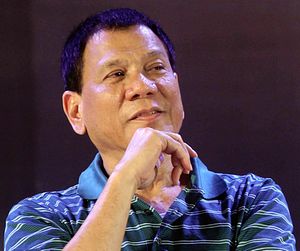The new president-elect of the Philippines, Rodrigo Duterte, came into office without a clear policy platform. On the campaign trail, Duterte had vowed to get tough on crime, duplicating his efforts as mayor of Davao on a national level. He had made vague promises of changing the Philippines’ political system to reduce the power of entrenched elites, and he had offered contradictory, sometimes confusing statements on the Philippines’ major security challenges — the ongoing threat of militant groups in the southern Philippines, and the growing contest with China over control of disputed parts of the South China Sea.
Since his election in early May, Duterte’s plans for his six year presidential term have become clearer. The first president to have come from the southern Philippines (Duterte was not born in Mindanao, but he served as mayor of Davao for decades), Duterte clearly intends to make ending the decades-long wars with southern insurgents and communist militants a centerpiece of his administration. He also clearly sees a need for a dramatic decentralization of power away from Manila, both to reduce the power of elites and to end insurgencies in the south. The decentralization of political and economic power in Indonesia since 1998 is an obvious inspiration for Duterte, according to several of his advisors; before the end of the Suharto regime, Indonesia was one of the most centralized states in the region. Today, Indonesia is one of the most federalized states in Southeast Asia, and other countries in the region, like Myanmar, also are looking at Indonesia as a potential model of decentralization.
As a new Wall Street Journal article notes, Duterte intends to change the constitution to transform the Philippines into a more federal country, proposing a national referendum for these constitutional change by 2019. Duterte will confront significant hurdles; as the Journal notes, previous Philippine presidents have not been able to push through constitutional changes. Still, the idea of decentralization makes real sense in such a large and diverse country, and decentralization has been effective in Indonesia in fostering political engagement and promoting economic competitiveness.
Duterte also has made clear that he intends to continue many of the Aquino administration’s economic policies, which should be reassuring to domestic and foreign investors. The Duterte administration, however, hopes to shift the Philippines’ economy in a way that brings broader growth. Duterte has promised to use his power to foster growth that not only expands the economy but helps reduce the Philippines’ high income inequality. Such a strategy includes fostering investment in the south and other outlying regions, and in making the economy more reliant on agricultural and manufacturing exports, rather than consumption, according to Duterte economic advisor Ernesto Pernia. As he notes, an economy so dependent on consumption is not creating enough jobs, especially given the Philippines’ high birth rate. The government also apparently plans to create new special economic zones, designed to attract investment, in areas other than Metro Manila and Central Luzon.
Finally, Duterte has begun to offer some clarity about his policies on the South China Sea. On the campaign trail, he often offered an olive branch to Beijing, suggesting he would break from the Aquino administration’s tough rhetorical approach and increasing military buildup. But there is little evidence that Duterte is going to completely break from Aquino’s policies. He has said that he will not rely on the United States for long-term security guarantees, and that his administration would be open to direct talks with Beijing about disputed areas, but he also has stated that the Philippines is not going to give up its rights to Scarborough Shoal. He also has not pulled back from the Philippines’ case before international arbitration in The Hague, as some of his critics suggested he might.
Joshua Kurlantzick is a fellow for Southeast Asia at the Council on Foreign Relations. This post appears courtesy of CFR.org.

































